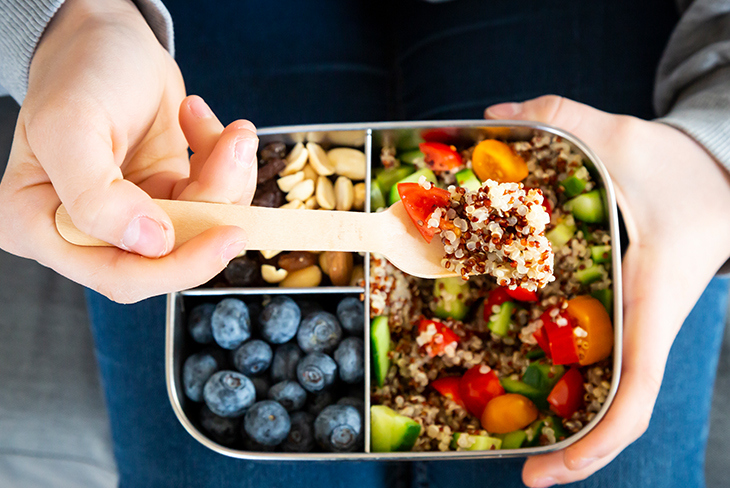The stroke prevention diet

Diet plays a crucial role in post-stroke recovery and stroke prevention, explains dietitian Ciska Smit. Here’s what she says about what you should and shouldn’t eat.
Ciska Smit, a dietitian at the Life Rehabilitation Unit at Life New Kensington Clinic in Johannesburg, advises patients who have had a stroke, as well as those at risk of having a stroke, about foods to prevent stroke and heart attack.
A stroke occurs when the blood supply to part of the brain is interrupted, preventing the brain tissue from receiving oxygen and nutrients.
According to the Heart and Stroke Foundation South Africa (HSFSA), 80% of heart disease and strokes that happen before the age of 70 can be prevented by healthy lifestyle and treating conditions such as hypertension, diabetes and high cholesterol. It’s also important to adhere to a regular screening schedule and act immediately if there are any signs that someone may be experiencing a stroke or TIA (Transient Ischaemic Attack).
The importance of good nutrition
‘Your food choices form a big part of your healthy lifestyle,’ says Ciska. ‘When I see a patient for the first time, I find out about their lifestyle. Why are they stressed, what causes unhealthy dietary choices and an inactive lifestyle? I do a full diet history and plan a stroke prevention diet for them. We set realistic goals, starting with understanding the basics of nutrition.’ Dietary restrictions can feel punitive and it can be tempting to dwell on what you can’t eat, rather than what you can.
‘It can be a big change for some people. I emphasise to my patients that the best diet plan for stroke patients is not about cutting out food groups but increasing the variety of food that you eat.
‘Food is supposed to be an enjoyable part of our lives and no diet or lifestyle change should take that away,’ says Ciska.
The best diet plan for stroke patients is the Dietary Approaches to Stop Hypertension (DASH) diet. The DASH diet focuses on fruits, vegetables, wholegrains and lean meats and was created after researchers found that people who ate a plant-based diet were less likely to have high blood pressure (hypertension). It is very similar to the Meditterranean diet, which focuses on fruit and vegetables and heart-healthy fats.
Six foods that prevent stroke
1. Fruit and vegetables
Increase fruit and vegetable intake: go for lots of different colours – deep reds, oranges, yellows, purples, blues and greens.
2. Whole foods
Make whole, unprocessed foods the basis of your diet.
3. Salt-free spice
Replace salt with herbs and salt-free spices such as turmeric, black pepper, cayenne pepper, cumin and paprika.
4. Fish
Eat more fish and consider plant-based sources of omega 3 such as chia or flaxseed.
5. Lean protein
Increase use of beans and legumes as protein sources. Choose leaner animal-protein sources like lean beef, white-fleshed fish and skinless white-meat poultry, and low-fat dairy options.
6. Water
Drink lots of fresh, hydrating water.
Foods to eliminate from your stroke diet
1. Salt
Most of our salt intake comes from processed foods and takeaways, says Ciska. High-salt foods to avoid or limit include:
- Biltong
- Salted crackers
- Chips
- Pretzels
- Cheese
- Sauces
- Processed meats
Also consider stock cubes, spice mixes (chicken spices, BBQ spice) soup powders and gravies that are often used during cooking.
2. Sugar
Reduce the consumption of sugar-sweetened cooldrinks and snacks. One small glass of juice (125ml) is sufficient per day.
3. Saturated fat
Swap animal fats that contain saturated fats with plant-based fats (avocado, seeds and nuts) that contain monounsaturated and polyunsaturated fats.
4. Refined carbohydrates
Replace refined carbs with low-GI, wholegrain starches.
5. Alcohol
Drink in moderation – no more than one drink per day for women and two drinks per day for men.
These recipes from the HSFSA have been tailored for stroke survivors.
Book an appointment with a Life Healthcare dietitian in your area to discuss your needs and create a personalised meal plan.
Visit your GP, local healthcare clinic or book a consultation at MyLife Healthcare Centre to assess your health and find out how you can make improvements.
The information is shared on condition that readers will make their own determination, including seeking advice from a healthcare professional. E&OE. Life Healthcare Group Ltd does not accept any responsibility for any loss or damage suffered by the reader as a result of the information provided.

